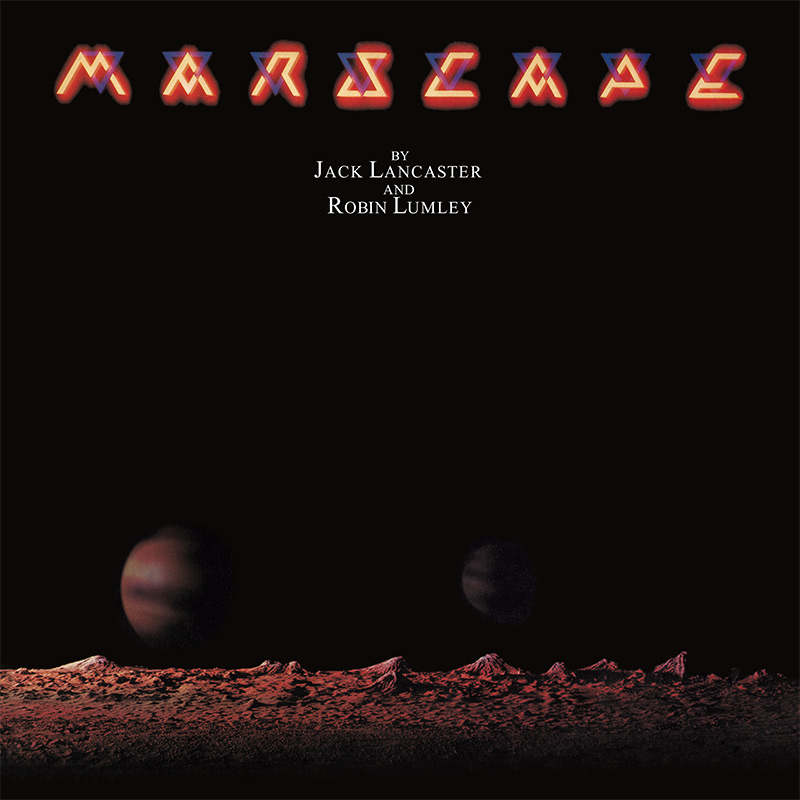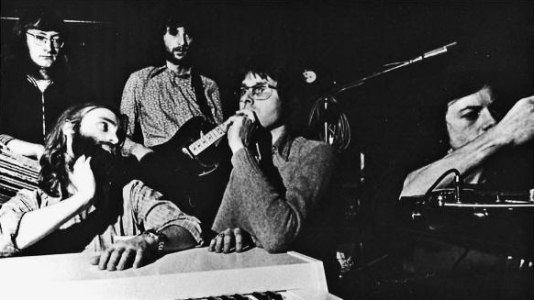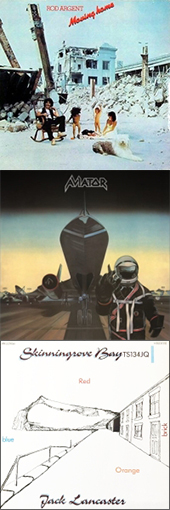- Article
- Read in 8 minutes
Jack Lancaster & Robin Lumley – Marscape (feat. Phil Collins) – review
The second project of the two science fiction fans Jack Lancaster and Robin Lumley was composed and conceived on the occasion of the landing of NASA’s Viking 2 Explorer on Mars planned for September. A new edition (remastered) has been released in 2022.

On the occasion of the 2021/22 reissues of the two Lancaster/Lumley
albums on Esoteric Recordings, remastered from the original tapes for
the first time, it is especially worthwhile for fans of Phil Collins’
second band in the 70s (Brand X) to take a closer look at these works
from 1975 and 1976, because the complete Brand X clan plays the music
here! It is probably known that keyboardist Robin Lumley was one of the
founding members of Brand X, but saxophonist and Bloodwyn Pig co-founder
Jack Lancaster is probably not known to everyone. But he, too, was part
of the musicians’ collective’s inner circle from the very beginning,
among many other musical activities. You can read a very informative
interview with him on DME – Let It Rock.
Lancaster and Lumley had already collaborated on music for Rank Organization short films in the late ’60s, and both are first heard on the title track of the 1974 debut album First Starring Role by Lancaster’s then-bandmate in the Mick Abrahams Band, Bob Sargeant. At the time, the two had formed a live jam band called Karass, which included drummer Chick Webb, their mutual bassist friend Percy Jones and Atomic Rooster guitarist John Goodsall. The circle expanded with varying musician guests at live gigs, and at some point they moved these jams to Island Studios as well, where the six-piece original lineup of what would later become Brand X eventually emerged over the course of the year – albeit without Lancaster. And after Phil Collins had joined the collective as a new drummer at the turn of the year and the first recordings were made that winter, Collins’ commitments with Genesis in the spring of 1975 led to an enforced break, which Lancaster and Lumley used to deepen their songwriting partnership.
You can find a separate review about Peter And The Wolf here.
After first Brand X live gigs in the Wirnter with, among others, Bill Bruford as guest percussionist, a Collins-related time out happened again in the spring of 1976, when the two rhythmists toured with Genesis, and the time to bridge could be used by the songwriting team Lancaster/Lumley again to work in France on their next joint album called Marscape. This project of the two science fiction fans was composed and conceived on the occasion of the landing of NASA’s Viking 2 Explorer on Mars planned for September. The recordings for it finally took place in the summer with the support of the full Brand X squad, holed up for three weeks back at Trident Studios between live gigs and BBC sessions.
 Besides the skills of the proven trio Goodsall, Jones and Collins, who formed the basis for the recordings, Lancaster and Lumley again count on the support of other guest musicians, such as Morris Pert on percussion, whom Lumley already knew from other productions, or once again Lancaster’s songwriting colleague Bernie Frost for some vocal interludes.
Besides the skills of the proven trio Goodsall, Jones and Collins, who formed the basis for the recordings, Lancaster and Lumley again count on the support of other guest musicians, such as Morris Pert on percussion, whom Lumley already knew from other productions, or once again Lancaster’s songwriting colleague Bernie Frost for some vocal interludes.
01 Take Off (Into Earth Orbit) (3:09)
The album begins with synth drone bass and a sound wood countdown, to finally “take off” with powerful gong thunderstorm towards the sky. Through the earth atmosphere Robin Lumley’s synth strings accompany us, which slowly fall silent. Arriving in orbit we first hear a minimalistic bowed double bass motif by Percy Jones with some synth dabs, to finally get in the mood for the journey with arpeggios on Rhodes piano and plucked double bass groove.
02 Sail On Solar Winds (The Journey) (2:48)
A musical guiding theme is introduced here by John Goodsall’s guitar and Morris Pert’s glockenspiel, and after a drum roll by Phil Collins, it’s off á la Brand X! A heavy groove with really very racy played hi-hat and weird guitar arpeggio form the basis for the melody line of Jack Lancaster’s soprano saxophone and the voice of Bernie Frost. After switching again to the lead theme, an improvisation section follows for Lumley on the Moog synthesizer, among others. Before announcing the arrival with riffs played in unison…
03 Arrival (Into Martian Orbit) (1:51)
With meditative piano playing by Lumley, we approach the Mars..
04 Phobos And Deimos (The Twin Moons Of Mars) (4:45)
The two Mars moons are first greeted with snappy march groove, Moog theme and Lancaster’s quick violin interjections. This is followed by a part with a relaxed Moog melody, only to lead into a slow groove with increasing, powerful piano chords, over which Lumley is allowed to solo and which is occasionally accompanied by Frost’s vocal interjections.
05 With A Great Feeling Of Love: Inner Warmth And Feeling Of Affinity(2:50)
With spherical Hammond organ and Rhodes sounds, one immediately feels transported into a state of suspension, and in that Lancaster delights us with relaxed melodic arcs on lyricon and tenor sax, embedded in sparse Rhodes piano chords and unobtrusive bass playing by Jones.
06 With A Great Feeling Of Love: Outer Cold And Icy Silence (2:12)
You can almost only hear the heartbeat pulsating, and minimalist piano dabs along with barely perceptible bass sounds.
07 Olympus Mons (5:19)
The next five minutes are devoted to the impressive Martian volcano. Initially still a frantically played groove by Lumley, Jones, Goodsall, Collins and Lancaster alternating from 4/4 to 5/4 beats, over which there is a casual sax solo by Lancaster (Foothills), a gong beat interrupts the flow to transition into a piano solo accompanied by choir voices and all manner of lava bubbling (Memories Of Lava Flows). Another gong-strike leads into a brisk Brand Xigen jazz rock part, in which Goodsall’s guitar and Lumley’s Moog engage in an extended battle that is in no way inferior to a volcanic eruption (Twenty-Five Kilometres High). Abruptly the spectacle ends.
08 Homelight (Reflecting On Distant Earth) (3:25)
A rapidly played intro on acoustic 12-string guitar introduces this look towards home, which first uses the leading motif of Solar Winds again, to then change into the relaxed piano part of Arrival, this time accompanied by Jones’ typical bass playing, and Goodsall’s picking on 12-string guitar, which is then also used for a melodic solo, embedded by soft violin chords. One ends up again with the Solar Winds motif and finally once more with the Arrival part.
09 Hopper (4:30)
A droll synth bass groove in 9/8 time with Perts percussion accompaniment opens this happy-go-lucky number about Martian hoppers. Collins and Goodsall get in on the action in 4/4 time, which may cause confusion for some listeners. However, almost schlager-like, Lyricon, Moog and guitar extensively solo over it. The outro is grooved by Collins and Pert alone…
10 Dust Storm (3:27)
Psychedelic is the way it goes here, when Pert goes wild with his percussion arsenal, until finally Collins, Goodsall and Jones groove in hectically, only to groove out again later.
11 Blow Holes (The Pipes Of Mars) (3:04)
Windy begins this experimental piece about tube-like formations on the surface of Mars, which, in addition to minimalist synth bass groove and accompanying percussion, is primarily characterized by Lancaster harmonically blown bottles, pan, alto and bamboo flutes. The koto played by Simon Jeffes also makes an appearance here.
12 Realisation (6:11)
Very balladic with Hammond organ and piano chords begins the longest track of the album, which is already joined by an almost gospel-like choir and Jones bass. But this idyll is interrupted by Lumley’s onset of a stirring staccato piano groove, which gradually increases with the introduction of drums and bass. Strings supporting the piano chords and melody arcs on the Moog follow, until Goodsall’s guitar – on top – also quotes the Solar Winds motif. The piece, which has grown to bombast in the meantime, is used for some solo interludes by Lyricon, Moog and finally also saxophone. At first the arrangement is reduced again to give space to choir voices, to then disappear together.
13 Release (2:21)
The closing piece is minimalist: two chords played by Lumley on AutoHarp alternate richly in variation, and Lancaster plays a relaxed flute solo over them.
The actual album would be finished here, but with this reissue we get a second helping with two bonus tracks, which were obviously intended for a single release, but ultimately remained unreleased until now.
14 With A Great Feeling Of Love(Single Version) (3:34)
Here we have to do with an independent recording. The second part of the sparsely instrumented track With A Great Feeling Of Love: Inner Warmth And Feeling Of Affinity forms the basis for this and is supplemented with drums, choir vocals and strings and expanded into a longer piece in the repetition.
15 Hopper (Single Version) (3:20)
In this edit, the otherwise 4:30-long track is merely trimmed by more than a minute at various points. Collin’s outro here is a reverb-free, straight 9/8 groove – probably stolen from the track’s drum track and pasted to the end.
All in all:
Marscape, released at the end of 1976 and thankfully presented here in a freshly restored digipak, cannot be directly compared with the previous album by Lancaster and Lumley. For one thing, the troupe involved here is much more manageable, which makes the overall sound more unified. The theme of the record is also quite different: “happy” music is not heard here except for a few moments, but it is arranged much more atmospheric and dynamic to capture the eeriness of space and strangeness of a distant planet.

However, you can recognize even more clearly the “brand” Brand X, because the musicians did not miss the opportunity to modify the template of Lancaster and Lumley in jam sessions according to their own ideas – this certainly made the concept album even more homogeneous. It is also extremely interesting how one can literally feel how an idiosyncratic percussionist with a profile like Morris Pert plays his way into the hearts of the X-Boys. Immediately after the recordings, he becomes a permanent and fifth member of Brand X as the successor of live support Preston Heyman.
 However, the collaboration between Jack Lancaster and Robin Lumley did not end with these two albums. Although the next Lancaster/Lumley project, Earth Sounds, planned for 1978, for which both wanted to travel around the world to record nature sounds, was apparently scrapped due to time constraints, Lumley instead produced, on the one hand, Rod Argent’s solo album Moving Home, on which Lancaster also participated, and, on the other hand, two tracks for the self-titled debut album by Lancaster’s new formation Aviator, consisting of Lancaster, Mick Rogers (Manfed Mann’s Earthband), Clive Bunker (Jethro Tull, Bloodwyn Pig) and John G. Perry (Caravan, Quantum Jump).
However, the collaboration between Jack Lancaster and Robin Lumley did not end with these two albums. Although the next Lancaster/Lumley project, Earth Sounds, planned for 1978, for which both wanted to travel around the world to record nature sounds, was apparently scrapped due to time constraints, Lumley instead produced, on the one hand, Rod Argent’s solo album Moving Home, on which Lancaster also participated, and, on the other hand, two tracks for the self-titled debut album by Lancaster’s new formation Aviator, consisting of Lancaster, Mick Rogers (Manfed Mann’s Earthband), Clive Bunker (Jethro Tull, Bloodwyn Pig) and John G. Perry (Caravan, Quantum Jump).
And the following year Lumley played and produced for Lancaster’s solo album Skinningrove Bay, which also featured Phil Collins on a track called Deep Green (later renamed The Whale’s Song) and again featured previously mentioned colleagues such as Gary Moore, Bernie Frost, Mick Rogers, Clive Bunker, John G. Perry and Rod Argent.
Marscapecan be ordered at CherryRed.
Check out our Brand X website special An Unorthodox History with a lot of background info!
